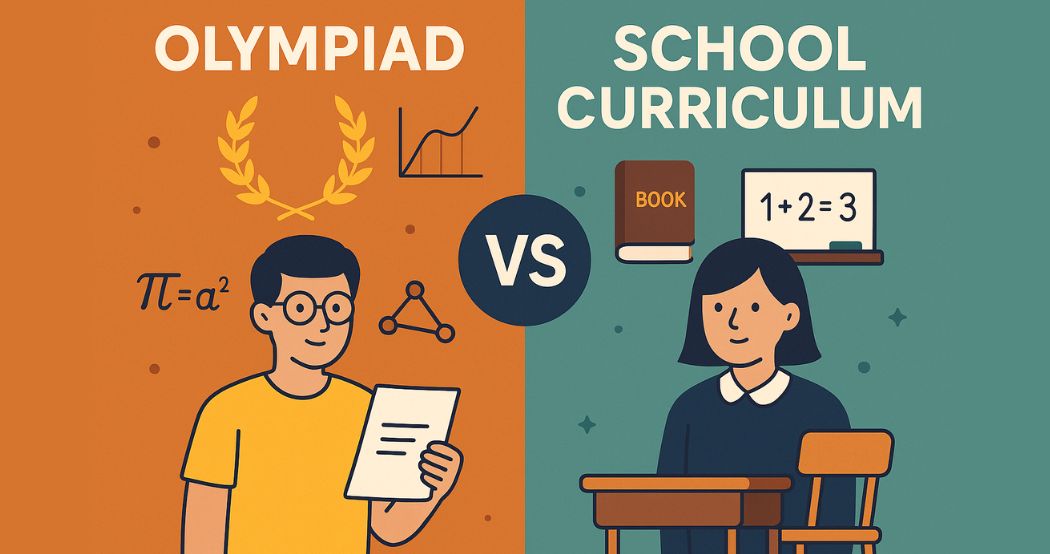Many parents havea question. Is there any difference between Olympiad preparation and school preparation? Definitely yes, and knowing the difference is the first step to supporting your child’s excellence both in school and beyond.
In this article, we discuss the differences between school preparation and Olympiad preparation, what to expect from the Olympiad syllabus vs. the school syllabus, and how Olympiads align with the CBSE or ICSE education boards. So, let’s break it down in a simple way for both parents and students.
What Is the School Curriculum?
The school curriculum is the structured academic plan set by educational boards like CBSE, ICSE, or state boards. It covers subjects such as:
- Math, Science, English, and Social Studies
- Topics are designed grade-wise and are often concept-based.
- Assessments include unit tests, midterms, and annual exams.
- The focus here is on building basic understanding and academic discipline throughout the school year.
What Are Olympiad Exams?
Olympiads are national or international competitive exams designed to test students. logical reasoning, problem-solving, and application-based knowledge. Subjects include Math Olympiads, Science Olympiads, English, GK, and Reasoning Olympiads
These exams help recognize talent and prepare students for future competitive exams like NTSE, JEE, NEET, and more.
Olympiad Syllabus vs School Syllabus
One common question from parents is, Do Olympiad exams follow the CBSE/ICSE syllabus? Yes, mostly. The Olympiad syllabus is generally based on the school curriculum (CBSE/ICSE/State boards), but the questions are more advanced. Here’s a key difference:
| Feature | School Syllabus | Olympiad Syllabus |
| Based on reasoning | CBSE/ICSE/State board curriculum | CBSE/ICSE/State board + advanced |
| Question type | Direct & theoretical | Application-based, logical reasoning |
| Questions In-depth clarity | Basic to moderate | Deep concept clarity, and critical thinking |
| Objective | Pass exams, grade progression | Identify talent, enhance competitive mindset |
So, while the topics overlap, Olympiads go beyond classroom-level questions.
Olympiad Preparation vs School Preparation
- School exam preparation mainly involves:
- Studying textbooks
- Memorizing facts
- Writing long answers
Olympiad preparation, on the other hand, includes:
- Solving tricky MCQs
- Practicing time-bound tests
- Strengthening logic, patterns, and comprehension
This shows why Olympiads are different from school tests, they challenge the student’s ability to think out of the box.
Is the Olympiad Tougher Than School Syllabus?
Yes, Olympiad exams are usually tougher than school syllabus tests. But that’s not a bad thing. Olympiads train students to think critically, manage time under pressure, and improve their problem-solving skills from a young age.
However, students who are well-prepared in school subjects and enjoy learning beyond textbooks usually perform very well in Olympiads.
Why Both Are Important
- Olympiads and school education go hand in hand. Here’s why both matter:
- A school syllabus builds a solid foundation of knowledge.
- Olympiad exams sharpen that knowledge and encourage higher-order thinking.
- Encouraging your child to attempt Olympiads can boost their confidence, enhance their academics, and give them a head start in competitive exams.
So, if you're thinking whether your child should take Olympiads, the answer is yes! With the right balance between Olympiad preparation and school preparation, your child can achieve in both.
Explore Olympiads offered by trusted platforms like Unicus Olympiads, which align with CBSE/ICSE syllabi and provide age-appropriate study materials, mock tests, and live classes.









